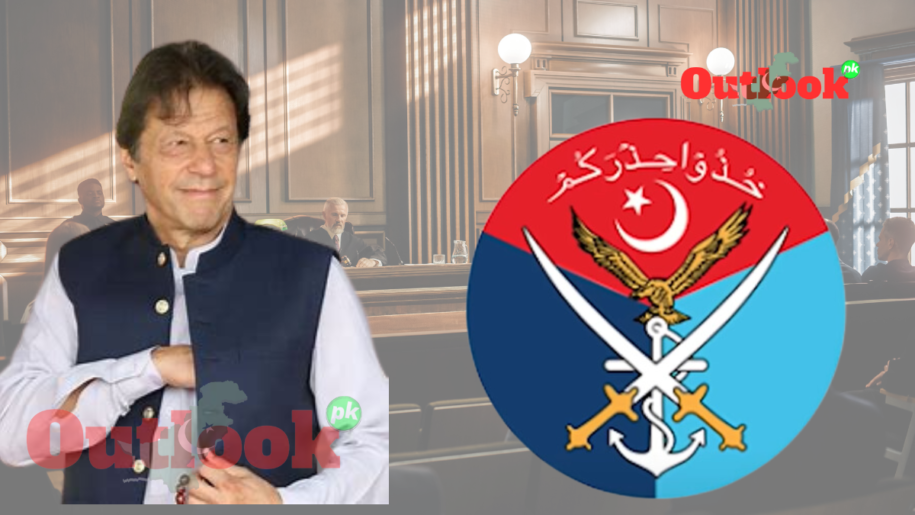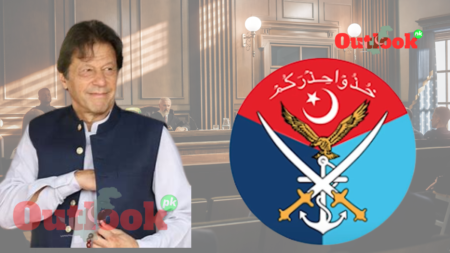Pakistan’s military history has always been characterized by a strong sense of fraternity and protectionism within its ranks. This protection has often extended well into the post-retirement lives of high-ranking officials, making them almost untouchable by legal or public scrutiny. However, in 2024, a significant and unprecedented event occurred that shook this very foundation: the initiation of a Field General Court Martial against General Faiz Hameed, a former ISI chief and a close confidant of Pakistan’s ex-Prime Minister, Imran Khan.
This blog delves into the intricate details of this court martial, its roots in the Top City case, the political implications for Pakistan Tehreek-e-Insaf (PTI), and how these developments may reshape the country’s future. We also explore the unexpected role of spirituality and superstition in shaping Pakistan’s political landscape.
Key Takeaways and Future Implications
- Military Accountability: The court martial of General Faiz Hameed marks a historic moment in Pakistan’s military history, signaling a potential shift towards greater accountability within the ranks.
- Political Fallout: PTI faces significant challenges as its close ties with the military come under increasing scrutiny. The trial could unearth damaging information that may erode the party’s support base.
- Civil-Military Relations: The trial has the potential to redefine the power dynamics between Pakistan’s military and civilian institutions, with far-reaching implications for the country’s political future.
- Spirituality and Politics: The influence of spiritual beliefs on political decision-making in Pakistan underscores the complexity of the country’s political landscape. The intertwining of faith and power continues to shape the actions of key political figures.
- Future of Democracy: This trial presents an opportunity for Pakistan to strengthen its democratic institutions and promote greater accountability, both within the military and across the political spectrum.
A Glance Back at Military Protectionism
Historically, Pakistan’s military has been fiercely protective of its high-ranking officials. Regardless of their retirement status or geographical location, the institution has maintained a tight grip on any information or legal actions involving these individuals.
This was clearly demonstrated during the era of General Pervez Musharraf, who imposed martial law, deposed the government of Nawaz Sharif, and handed over numerous Pakistani citizens to the United States. Despite such controversial actions, Musharraf remained largely protected from any significant legal repercussions, a testament to the military’s cohesive and protective nature.
This historical trend of military protectionism has often shielded individuals from the consequences of their actions, leading to a culture where accountability within the military ranks was rarely seen. However, the court martial of General Faiz Hameed marks a significant departure from this norm, signaling a potential shift in how the military handles internal accountability.
The Unfolding of General Faiz Hameed’s Court Martial
The announcement of a Field General Court Martial against General Faiz Hameed on August 12, 2024, by the Inter-Services Public Relations (ISPR) was a landmark event. Hameed, known for his strategic mind and deep ties with PTI, especially with Imran Khan, now faces charges that have sent shockwaves through political and military circles alike. The charges against Hameed are multifaceted, ranging from post-retirement political maneuvering to corruption-related allegations, with the most prominent being his involvement in the Top City case.
The Top City Case: Corruption or Political Vendetta?
Top City is a real estate development project in Islamabad that has been mired in controversy since its inception. Initially spearheaded by Zahida Javed Aslam and her brother Iftikhar, the project later saw the involvement of Major Moiz Khan, who took over after Iftikhar’s tragic suicide. The case gained prominence in 2017 when Zahida Javed received a call from the Inter-Services Intelligence (ISI) claiming that the land near Islamabad Airport, where Top City is located, was being used for terrorist activities.
Following this, in May 2017, the ISI conducted raids on Top City’s premises, leading to the confiscation of assets and the arrest of Major Moiz Khan. According to court petitions, these raids were conducted under the direct orders of General Faiz Hameed, who was then a top ISI official. It was alleged that during these raids, significant amounts of gold, cash, and other valuables were seized, some of which never made it back to their rightful owners.
Media reports at the time, heavily influenced by Hameed’s connections, painted the raids as a necessary action to curb terrorism. However, those closely involved in the case, including the owners of Top City, claimed that the real motive behind the raids was financial gain and political manipulation. This case not only exposed the deep entanglement of military officials in civilian matters but also highlighted the pervasive corruption that can occur when power is unchecked.
The Political Web: Faiz Hameed and PTI’s Nexus
The connection between General Faiz Hameed and PTI, particularly Imran Khan, is a critical element in understanding the broader implications of this court martial. Hameed, after his retirement, was widely believed to continue his involvement in political maneuvering in favor of PTI, a direct violation of the Army Act, which prohibits retired military officials from engaging in political activities for a certain period post-retirement.
Imran Khan, who relied heavily on Hameed’s support during his tenure as Prime Minister, found himself in a precarious position following the announcement of the court martial. Hameed had been instrumental in several key political maneuvers that had bolstered Khan’s position, including the 2018 general elections, where allegations of military interference in favor of PTI were rampant.
The 2018 Elections and Beyond: A Glimpse into Military-Political Dynamics
The 2018 general elections in Pakistan were marked by widespread allegations of rigging and manipulation, with PTI emerging as the dominant political force. Many political analysts and opposition parties accused the military, particularly General Faiz Hameed, of orchestrating the elections in PTI’s favor. These accusations were fueled by reports of military personnel directly influencing electoral processes, intimidating opposition candidates, and ensuring that PTI secured a majority in the National Assembly.
Hameed’s role in these elections, though never officially acknowledged, was a poorly kept secret. His influence extended beyond the elections, as he continued to support PTI’s political strategies, often blurring the lines between military and civilian roles. This symbiotic relationship between Hameed and PTI reached its zenith during the early years of Imran Khan’s premiership, where the military’s backing was crucial in implementing PTI’s policies and maintaining political stability.
However, this close relationship began to unravel in 2021 when General Nadeem Anjum succeeded Hameed as the ISI chief. Khan’s discomfort with Anjum’s appointment, which he saw as a potential threat to his political ambitions, marked the beginning of a rift between PTI and the military establishment. Khan’s insistence on retaining Hameed in a key position, despite the military’s decision to move him, highlighted the growing tensions within the power corridors of Pakistan.
The Spiritual Angle: Superstition and Power in Pakistan’s Politics
One of the more curious aspects of this saga is the role of spirituality and superstition in Pakistan’s political landscape. Imran Khan’s well-documented reliance on his spiritual guide, Bushra Bibi, and her connections with General Faiz Hameed, adds a layer of complexity to the narrative. Bushra Bibi, often referred to as Khan’s spiritual advisor, wielded considerable influence over his decisions, both personal and political.
Reports suggest that General Faiz Hameed was not just a military strategist but also played a role in the spiritual realm of Khan’s inner circle. Hameed would reportedly provide advance information to Bushra Bibi, who would then relay this to Khan, often with startling accuracy. This dynamic further cemented Hameed’s position within PTI, as Khan increasingly relied on spiritual guidance to navigate the turbulent waters of Pakistani politics.
The influence of spirituality and superstition in decision-making at the highest levels of government is not unique to Khan or PTI. However, in this case, it underscores the unusual methods employed by Khan and his close associates in their quest for political power. This reliance on spiritual advice, coupled with Hameed’s strategic acumen, created a potent combination that shaped Pakistan’s political trajectory in significant ways.
The Court Martial: A Turning Point in Civil-Military Relations
The initiation of a court martial against a high-ranking officer like General Faiz Hameed is not just unprecedented; it represents a critical turning point in Pakistan’s civil-military relations. For decades, the military has operated as a parallel power structure, often overshadowing civilian governance. This court martial could signal the beginning of a new era, where even the most powerful military figures are not immune to accountability.
The court martial process is expected to be closely watched, not just within Pakistan but also by international observers. The outcome of this trial will likely set a precedent for how the military handles internal accountability and could potentially redefine the power dynamics between the military and civilian government.
The Fallout for PTI: Navigating a Political Minefield
As the court martial of General Faiz Hameed proceeds, PTI finds itself in a politically precarious position. Imran Khan’s recent statements, in which he lamented the loss of Hameed as an “asset wasted,” reflect his deep concern over the implications of this trial. Hameed’s court martial not only threatens to expose the inner workings of PTI’s political strategies but also raises the specter of further legal actions against other party members.
Khan’s close association with Hameed, particularly during key political events such as the 2018 elections and subsequent political maneuvers, makes PTI vulnerable to further scrutiny. The trial could unearth damaging information that might undermine PTI’s political standing and erode its support base, both within the military and among the general public.
The Broader Implications for Pakistan’s Political Landscape
The court martial of General Faiz Hameed is not just a singular event; it is part of a broader shift in Pakistan’s political landscape
. The military, long seen as the ultimate power broker in Pakistani politics, is now grappling with internal divisions and challenges to its authority. This trial could potentially weaken the military’s grip on political affairs, leading to a more balanced distribution of power between civilian and military institutions.
However, the road ahead is fraught with challenges. The military’s response to this trial, and how it navigates the fallout, will be crucial in determining the future of civil-military relations in Pakistan. A successful prosecution could embolden civilian institutions and encourage greater transparency and accountability within the military. Conversely, a botched trial or perceived injustice could exacerbate tensions and lead to further instability.
The Future of Pakistan’s Democracy: Challenges and Opportunities
The court martial of General Faiz Hameed, and the surrounding political drama, highlights the challenges facing Pakistan’s democracy. The intertwining of military power, political ambition, and spiritual influence creates a complex web that is difficult to untangle. However, this moment also presents an opportunity for Pakistan to strengthen its democratic institutions and promote greater accountability across all levels of government.
For PTI, the trial represents a significant test of its resilience and political acumen. How the party navigates this crisis will determine its future trajectory and its ability to maintain its position as a major political force in Pakistan. For the military, the trial is an opportunity to demonstrate its commitment to internal accountability and to reinforce its role as a professional, apolitical institution.
FAQs
What is the significance of the court martial against General Faiz Hameed?
The court martial is significant as it represents a departure from the traditional protectionism within Pakistan’s military. It could signal a shift towards greater accountability and transparency within the military ranks, setting a precedent for future actions.
How does the Top City case relate to the current political situation in Pakistan?
The Top City case is central to the charges against General Faiz Hameed. It involves allegations of corruption and misuse of power, which have significant political implications, especially for PTI, as it reveals the deep connections between military officials and political figures.
What role does spirituality play in Pakistan’s politics?
Spirituality, particularly through figures like Bushra Bibi, has played a significant role in shaping the decisions of key political leaders, including Imran Khan. This influence highlights the complex interplay between faith, superstition, and politics in Pakistan.
What are the broader implications of this trial for Pakistan’s political future?
The trial could lead to a redefinition of civil-military relations in Pakistan, potentially weakening the military’s grip on political affairs and encouraging greater transparency and accountability. It also presents a challenge for PTI, which may have to navigate the fallout from this unprecedented event.
How might this trial affect the future of PTI?
PTI could face significant challenges as the trial progresses, especially if it reveals damaging information about the party’s political strategies and its reliance on military support. The trial could undermine PTI’s standing and weaken its influence in Pakistani politics.
پاکستان کی فوجی تاریخ کا بے مثال موڑ
پاکستان کی فوجی تاریخ ہمیشہ ایک خاص نوعیت کی حفاظت اور یکجہتی پر مبنی رہی ہے۔ یہ حفاظت اکثر اعلیٰ فوجی افسران کے ریٹائرمنٹ کے بعد بھی جاری رہتی ہے، جس کی وجہ سے انہیں عوامی یا قانونی نگرانی سے محفوظ رکھا جاتا ہے۔ تاہم، 2024 میں ایک اہم اور بے مثال واقعہ پیش آیا جس نے اس روایت کو ہلا کر رکھ دیا: جنرل فیض حمید کے خلاف فیلڈ جنرل کورٹ مارشل کا آغاز۔
یہ بلاگ جنرل فیض حمید کے کورٹ مارشل کی تفصیلات، اس کے سیاسی اثرات، اور پاکستان تحریک انصاف (پی ٹی آئی) کے لئے ممکنہ نتائج پر روشنی ڈالتا ہے۔ ہم یہ بھی جاننے کی کوشش کریں گے کہ روحانیت اور توہم پرستی نے پاکستان کی سیاست میں کیا کردار ادا کیا ہے۔
فوجی تحفظ کی روایت پر ایک نظر
پاکستان میں فوجی ادارہ ہمیشہ اپنے اعلیٰ افسران کی حفاظت کرتا رہا ہے۔ چاہے وہ ریٹائرڈ ہو جائیں یا ملک سے باہر چلے جائیں، ان پر عوام یا قانونی دائرہ کار سے باہر رہتے ہیں۔ جنرل پرویز مشرف کے دور میں یہ بات واضح طور پر دیکھی گئی، جب انہوں نے مارشل لا نافذ کیا، نواز شریف کی حکومت کو معزول کیا، اور ہزاروں پاکستانیوں کو امریکہ کے حوالے کیا۔ اس کے باوجود، مشرف کو قانونی نتائج سے بچانے کے لئے فوجی ادارے نے ان کی حفاظت کی۔
یہ فوجی تحفظ کی روایت جنرل فیض حمید کے کورٹ مارشل کے آغاز کے ساتھ ٹوٹتی نظر آتی ہے، جس سے یہ اشارہ ملتا ہے کہ فوج اب اندرونی احتساب کے بارے میں ایک نیا رویہ اختیار کر رہی ہے۔
جنرل فیض حمید کا کورٹ مارشل: ایک بے مثال قدم
12 اگست 2024 کو آئی ایس پی آر کی جانب سے جنرل فیض حمید کے خلاف فیلڈ جنرل کورٹ مارشل کے آغاز کا اعلان کیا گیا۔ حمید، جو کہ پی ٹی آئی کے ساتھ قریبی تعلقات رکھتے تھے، اب مختلف الزامات کا سامنا کر رہے ہیں۔ ان الزامات میں پوسٹ ریٹائرمنٹ سیاسی سرگرمیوں میں ملوث ہونے کے ساتھ ساتھ کرپشن کے الزامات بھی شامل ہیں، جن میں سب سے اہم ٹاپ سٹی کیس ہے۔
ٹاپ سٹی کیس: کرپشن یا سیاسی انتقام؟
ٹاپ سٹی ایک رئیل اسٹیٹ ڈویلپمنٹ پروجیکٹ ہے جو اسلام آباد میں واقع ہے اور اپنے قیام سے ہی تنازعات کا شکار رہا ہے۔ ابتدائی طور پر یہ پروجیکٹ زاہدہ جاوید اسلم اور ان کے بھائی افتخار کی نگرانی میں تھا۔ افتخار کی خودکشی کے بعد، پروجیکٹ کی نگرانی میجر موئز خان نے سنبھالی۔
2017 میں زاہدہ جاوید کو آئی ایس آئی کی جانب سے ایک کال موصول ہوئی جس میں دعویٰ کیا گیا کہ اسلام آباد ایئرپورٹ کے قریب واقع ان کی زمین دہشت گردی کی سرگرمیوں کے لئے استعمال ہو رہی ہے۔ اس کے بعد، مئی 2017 میں آئی ایس آئی نے ٹاپ سٹی کے احاطے پر چھاپے مارے، جس میں اثاثے ضبط کئے گئے اور میجر موئز خان کو گرفتار کیا گیا۔ عدالتی درخواستوں کے مطابق، یہ چھاپے جنرل فیض حمید کے براہ راست احکامات پر کئے گئے تھے۔
سیاسی پیچیدگیاں: فیض حمید اور پی ٹی آئی کا تعلق
جنرل فیض حمید اور پی ٹی آئی، خاص طور پر عمران خان کے درمیان تعلقات اس کیس کی پیچیدگی کو سمجھنے کے لئے اہم ہیں۔ حمید، ریٹائرمنٹ کے بعد بھی پی ٹی آئی کے حق میں سیاسی منورنگ کرتے رہے، جو کہ آرمی ایکٹ کی خلاف ورزی ہے۔
عمران خان، جنہوں نے اپنی وزارت عظمیٰ کے دوران حمید کی حمایت پر انحصار کیا تھا، اب کورٹ مارشل کے اعلان کے بعد ایک نازک پوزیشن میں ہیں۔ حمید نے 2018 کے عام انتخابات سمیت کئی کلیدی سیاسی اقدامات میں اہم کردار ادا کیا، جس نے خان کی پوزیشن کو مضبوط کیا۔
فوجی-سیاسی تعلقات کی جھلک 2018 کے انتخابات اور اس سے آگے
2018 کے عام انتخابات میں پی ٹی آئی کی کامیابی پر دھاندلی اور مداخلت کے الزامات لگائے گئے۔ بہت سے سیاسی تجزیہ کاروں اور اپوزیشن جماعتوں نے فوج، خاص طور پر جنرل فیض حمید، پر الزام لگایا کہ انہوں نے انتخابات کو پی ٹی آئی کے حق میں منظم کیا۔
حمید کا کردار ان انتخابات میں، حالانکہ کبھی سرکاری طور پر تسلیم نہیں کیا گیا، لیکن ایک کھلا راز تھا۔ ان کا اثر و رسوخ انتخابات کے بعد بھی جاری رہا، کیونکہ انہوں نے پی ٹی آئی کی سیاسی حکمت عملیوں کو سپورٹ کیا۔
روحانی زاویہ: پاکستان کی سیاست میں توہم پرستی اور طاقت کا کردار
اس کیس کے ایک دلچسپ پہلو یہ ہےکہ کس طرح روحانیت اور توہمات نے پاکستان کی سیاست میں کلیدی کردار ادا کیا۔ عمران خان کی اپنی روحانی رہنما، بشریٰ بی بی، پر انحصار اور ان کے جنرل فیض حمید کے ساتھ تعلقات نے پی ٹی آئی کی سیاست میں ایک نیا پہلو متعارف کروایا ہے۔
کورٹ مارشل: سویلین-فوجی تعلقات کا ایک نیا موڑ
اعلیٰ فوجی افسر کے خلاف کورٹ مارشل پاکستان کی تاریخ میں بے مثال ہے۔ یہ قدم فوج کے احتساب کی نئی دور کی نشاندہی کرتا ہے اور ملک میں سویلین اور فوجی تعلقات کے مستقبل کے بارے میں سوالات اٹھاتا ہے۔
پی ٹی آئی کے لئے ممکنہ نتائج: ایک سیاسی بحران کا سامنا
جنرل فیض حمید کے کورٹ مارشل کے دوران، پی ٹی آئی ایک نازک سیاسی صورتحال میں ہے۔ عمران خان کے حالیہ بیانات، جن میں انہوں نے حمید کو ایک “ضائع کیا ہوا اثاثہ” قرار دیا، ان کی گہری تشویش کا اظہار کرتے ہیں۔
پاکستان کے سیاسی منظرنامے کے وسیع اثرات
جنرل فیض حمید کا کورٹ مارشل پاکستان کے سیاسی منظرنامے میں ایک وسیع اثر ڈال سکتا ہے۔ فوج، جو طویل عرصے سے پاکستانی سیاست میں سب سے بڑی طاقتور قوت سمجھی جاتی ہے، اب اندرونی تقسیمات اور چیلنجز کا سامنا کر رہی ہے۔ یہ مقدمہ فوج کی سیاسی امور پر گرفت کو کمزور کر سکتا ہے، جس سے سویلین اور فوجی اداروں کے درمیان طاقت کی تقسیم زیادہ متوازن ہو سکتی ہے۔
پاکستان کی جمہوریت کا مستقبل: چیلنجز اور مواقع
جنرل فیض حمید کا کورٹ مارشل اور اس کے ساتھ منسلک سیاسی ڈراما پاکستان کی جمہوریت کے لئے چیلنجز کو نمایاں کرتا ہے۔ فوجی طاقت، سیاسی عزائم، اور روحانی اثرات کا ملاپ ایک پیچیدہ جال بناتا ہے جس کو حل کرنا مشکل ہے۔ تاہم، یہ لمحہ پاکستان کے لئے ایک موقع بھی پیش کرتا ہے کہ وہ اپنی جمہوری اداروں کو مضبوط کرے۔
پی ٹی آئی کے لئے، یہ مقدمہ اس کی لچک اور سیاسی حکمت عملیوں کا ایک بڑا امتحان ہے۔ پارٹی اس بحران کو کس طرح سنبھالتی ہے، اس کا مستقبل کا راستہ اور اس کی پوزیشن کو برقرار رکھنے کی صلاحیت کا تعین کرے گا۔
اہم نکات اور مستقبل کے نتائج
فوجی احتساب: جنرل فیض حمید کے خلاف کورٹ مارشل کا آغاز پاکستان کی فوج میں احتساب کے نئے دور کی نشاندہی کرتا ہے۔
سیاسی نتائج: پی ٹی آئی کو فوج سے اپنے قریبی تعلقات کے بارے میں سوالات کا سامنا کرنا پڑ رہا ہے۔
سویلین-فوجی تعلقات: یہ مقدمہ پاکستان کے سویلین اور فوجی اداروں کے درمیان طاقت کی تقسیم کو دوبارہ متعین کر سکتا ہے۔
سیاست میں روحانیت: روحانی عقائد نے پاکستان کی سیاست میں اہم کردار ادا کیا ہے۔
جنرل فیض حمید کے خلاف کورٹ مارشل کی کیا اہمیت ہے؟
یہ پاکستان کی فوجی تاریخ میں بے مثال ہے، جو فوج میں زیادہ شفافیت اور احتساب کی نشاندہی کرتا ہے۔
ٹاپ سٹی کیس کا موجودہ سیاسی صورتحال سے کیا تعلق ہے؟
یہ کیس سیاسی اثرات رکھتا ہے، خاص طور پر پی ٹی آئی اور فوج کے تعلقات کے حوالے سے۔
سیاست میں روحانیت کا کیا کردار ہے؟
پاکستان کی سیاست میں روحانی عقائد اور توہمات نے کلیدی شخصیات کے فیصلوں پر اثر ڈالا ہے۔
اس مقدمے کے پاکستان کے سیاسی مستقبل پر کیا وسیع اثرات ہوں گے؟
یہ مقدمہ سویلین اور فوجی اداروں کے درمیان طاقت کی تقسیم کو دوبارہ متعین کر سکتا ہے۔
اس مقدمے کا پی ٹی آئی کے مستقبل پر کیا اثر ہوگا؟
مقدمہ پی ٹی آئی کے سیاسی مستقبل کو متاثر کر سکتا ہے، خاص طور پر اگر یہ پارٹی کی سیاسی حکمت عملیوں کے بارے میں نقصان دہ معلومات سامنے لاتا ہے۔







